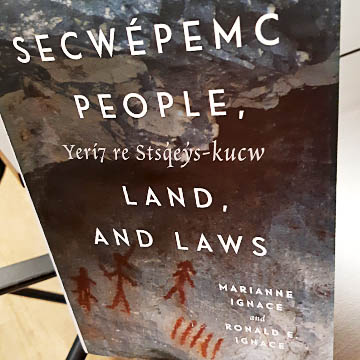Reconciliation and indigenization is about changing our relationship with ourselves and others. With this in mind, the English as a Second Language (ESL) department is exploring reconciliation and indigenization in its classes at TRU.
The department has implemented a range of initiatives to address the Calls to Action within the Truth and Reconciliation Commission final report. And other changes are to come.
“Students now have a way to compare Indigenous ways here and with those in their own country,” said TRU ESL Chair, Dian Henderson. “Indigenization is also an opportunity to think about the effects of colonization, and for students to perhaps ask: What is colonization like in my country and what’s it like compared to Canada?”
Students are also encouraged to address stereotypes and misconceptions they may have about Indigenous peoples in Canada and around the world.
Some ESL initiatives in action
“These efforts are very small in relation to the Calls to Action and the Truth exposed in that report, but we are searching for what it means to live here as settlers and to teach the language that was used as part of that colonization,” Henderson said. “[The ESL Department] have begun the journey and we remain thankful to the Secwépemc people for their patience and guidance on such things.”

Using the book club format, the ESL department is discussing a different chapter from this book during departmental meetings. It is written by Dr. Marianne and Ron Ignace.
Visit our class
Faculty are encouraged to bring in guests, including elders and Indigenous community partners as a way of complementing and enriching course material. Bringing in guests has proven so popular, that the department increased its annual budget for honoraria.
Acknowledging territory
At the top of every course outline is the territorial acknowledgement: “The campuses of Thompson Rivers University are located on the traditional and unceded territory of the Secwépemc Nation within Secwepemcúlucw. As we share knowledge, teaching, learning and research within this university, we recognize that this territory has always been a place of teaching, learning and research,” Henderson said.
This recognition offers faculty the opportunity to discuss and explain why the acknowledgement is personally important to them.
Read it on the wall
Posted on the wall of every ESL-designated classroom is a two-sided map—one side shows the Indigenous territories of British Columbia, including the languages spoken and the pronunciations of each of those. The other side has suggestions on how to incorporate Indigenous culture and ways into study areas like geography, history, science, art and math.
English as an Additional Language Awareness Week
TRU’s English as an Additional Language Awareness Week included Indigenous learning: a Drop the Guilt workshop with sociology and anthropology faculty member Monica Sanchez, the participatory KAIROS Blanket Exercise and an evening of food and storytelling with representatives from local Indigenous groups.
“Part of the awareness was to illustrate that having to learn English isn’t a deficit nor something that should hold students back,” Henderson said. “We wanted to show that having first, second and other languages could be a strength to understanding and expanding worldviews.”
Going forward
New courses with Indigenous outcomes
Still in the proposal stage, the department has created a new curriculum that could launch in the next academic year. The curriculum includes learning outcomes tied to developing awareness of international and Indigenous cultures and practices.
Book club
Inspired by a presentation at the 2019 TRU Teaching Practices Colloquium, ESL faculty are starting a book club to discuss chapters from Secwépemc People, Land, and Laws, by Dr. Marianne and Ron Ignace.
“We’ll use the book as a way of informing our practice and informing the questions, ‘Who am I on this land?’ and then ‘Who am I in this classroom?’ We cannot just shift indigenization onto students. Reconciliation is an inside job, so faculty must begin to shift and reconcile classroom practices and ways of being and knowing.” Henderson said.
Rounding of meetings
ESL department meetings may periodically be held in circle—a circular shape instead of in a square, rectangle or a series of rows. The circle is a recurring shape in Indigenous cultures and symbolizes interconnectedness, equality, continuity and a way to reflect and create relationship.
“Even if we only meet in circle once a semester, it’s a good way of shifting our delivery and even our way of being,” Henderson said.

